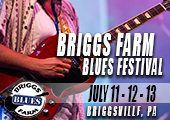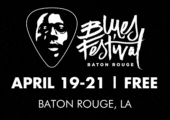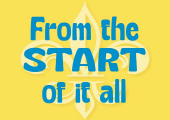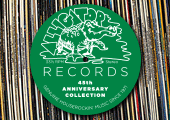ZAC HARMON
Long as I Got My Guitar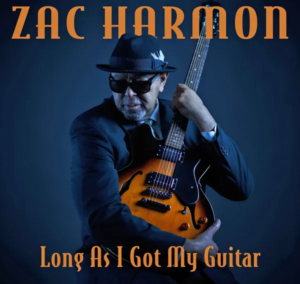
Catfood Records – CFR 031
Coming off the success of his 2019 debut album for Catfood Records (Mississippi BarBQ), Zac Harmon steps forward with his newest work, Long as I Got My Guitar. Label owner Bob Trenchard has once again joined forces with Zac Harmon to pen ten mellow tunes for the Texas-based guitarist and BMA winner, offering 40 minutes of solid grooves.
The album gets off to an energetic start with Deal with the Devil, a minor-key blues that lives on the funky side, with Harmon demonstrating a guitar tone and phrasing that resembles Albert King. People Been Talking is a tune that warns his woman about “how word gets around . . . all over town” while he’s out on the road. Shades of Robert Cray emerge in both his lyrics and vocal phrasing, supported by the sweet background vocals of Sue Ann Carwell and Corey Lacy.
The love-and-regret lyrics of Crying Shame are fused with Louisiana Cajun soul as Dan Ferguson’s zydeco-style accordion riffs scatter like spices over the 6/8 shuffle. Meanwhile, Soul Land demonstrates his smooth vocal style, a tune with laid-back feel that embraces the sweet “back to the basics” soul music that Harmon longs for.
Long as I Got My Guitar shares Zac’s frustration with life’s setbacks, but he exclaims, “I’m still a star, long as I got my guitar.” Indeed, it’s maybe the strongest performance on the entire album. Waiting to Be Free confronts issues of racism and oppression that still exist in society with politicians on TV making false promises about equality. “That’s their thing, but I ain’t heard freedom ring.” The album ends on a somber note, with the gospel-tinged Ashes to the Wind that reveals Harmon’s vocal prowess as well as any track in the set.
The album is right and tight, as Zac is backed by the Rays, an always-polished studio band led by label owner Bob Trenchard on bass, Dan Ferguson on keyboards, drummer Richy Puga, and Johnny McGhee on guitar. Guided by the platinum producer Jim Gaines, Harmon’s new album extends his winning streak of releasing discs that are always worthy of spinning.
—Wayne Goins
CEDRIC BURNSIDE
 I Be Trying
I Be Trying
Single Lock – SLO52
Cedric Burnside continues to carry on the venerated Burnside family tradition with his personalized take on the intense, often hypnotic blues sound that his grandfather, the late R.L. Burnside, played a dominant role in popularizing. In Cedric’s hands, though, the wracked intensity often associated with the style has broadened into a more subtly textured, but no less deeply felt, emotional acuity. Even when he’s pleading for divine intervention to salve earthly torments, as in Step In (“I feel like I’m lost and can’t be found . . . please, Lord, step in”), both his singing and his playing are infused with light, as if in testimony to the old folk adage that “trouble don’t last always”—it’s a testimony of resolve from a man determined to rid his life, and his heart, of negativity and self-sabotage. The angelic-sounding backing chorus that elevates the title song (apparently vocalist Portrika Burnside multi-tracked) accentuates the feel of hard-won peace, even optimism, that permeates this set. Burnside, in fact, created a new kind of blues persona—he’s transformed the archetypal “blues outlaw” into a repentant man, honest about his transgressions and strong enough to face down their consequences.
Despite its deceptive simplicity, the Hill Country style is capable of expressing depths and subtleties of emotion that few other blues genres can approximate. Burnside’s vocals and guitar (both electric and acoustic) grace all 13 of the tracks here; he plays drums on six of them; Reed Watson contributes “drums and percussion” on seven. They share percussion duties on Gotta Look Out, a cautionary tale whose quick-stepping rhythmic lope is that of a man negotiating—perhaps even dancing—his way through an existential minefield (the image of the fast-footed escapee, dodging death and danger on his journey to freedom, is one of the most venerable and profound in Black folk tradition—Burnside brings it to life here with uncompromising force). Aside from the above-mentioned Portrika Burnside, Luther Dickinson (guitar), Zac Cockrell (bass), and Caleb Elliot (cello) also contribute at various points.
Recognition should also be given to producer Lawrence “Boo” Mitchell, who oversees the operations at Royal Studios in Memphis, the recording center that his father, the legendary Willie Mitchell, made into one of the world’s most prestigious soul and R&B powerhouses in the 1970s and ’80s. For all his modern-day success in pop, rock, and hip-hop, Boo shows himself here to be just as deft and sensitive with rootsy, sparse material as he is with high-tech modernism. Channeling the visionary, generous spirit that made his father one of the most beloved figures in Memphis music, Mitchell, along with Burnside and his compatriots, has crafted a work that’s as uplifting as it is uncompromisingly honest.
—David Whiteis
VALERIE JUNE
 The Moon and Stars: Prescriptions for Dreamers
The Moon and Stars: Prescriptions for Dreamers
Fantasy – FAN01054
In the years since Valerie June released her 2017 album, The Order of Time (LB #247), she has continued to expand her horizons on her own terms. The Humboldt, Tennessee, native has won admirers such as Bob Dylan and the late John Prine; made her Grand Ole Opry debut in September 2021; and even published her first book, the poetry collection Maps for the Modern World (Andrews McMeel, 2021).
June has also continued developing her music in the direction mapped out by her sophomore album. Her latest release, The Moon and Stars: Prescriptions for Dreamers, sounds as celestial as the title implies, yet is tethered to earth by her folk, blues, country, soul, and gospel roots. The result is heartening and sublime. If music is medicine, these songs are soothing tonic.
June’s sunny, positive outlook and calming spirit center the proceedings. She often posts guided meditations on her social media accounts, and the album is presented in a similar manner, with subtitles that underscore the themes of each song (the opening track, Stay, is subtitled “For: Impermanence • Being Present • Interconnectivity”). Falling in and out of love, letting go, and finding peace are the primary focus of June’s lyrics, and the serenity she summons throughout passes easily to the listener.
Bathed in soft echo, Stay’s church piano and acoustic guitar yield to synths swirling around strings, flute, and percussion. She filters Stax soul through gossamer psychedelia on Stardust Scattering, with drum machines and banjo capped by a rousing horn section. The urban beat of Smile and New Age feel of Within You are balanced by the gentle folk guitar of Fallin’ and the gospel organ and pedal steel on Two Roads. Her voice, reedy and sweet as cane, floats and bends through these soundscapes, swelling with emotion at times but never breaking.
Speaking of Stax, Carla Thomas narrates African Proverb (“Only a fool / tests the depths of the water / with both feet”), then contributes vocals to Call Me a Fool. June wrote the ballad as an answer to Thomas’ What a Fool I’ve Been, and answer it she does—with full-throated vocals soaring over orchestral backing and production by Boo Mitchell, it’s an instant soul classic.
There are multiple CD and LP versions of this release, including a limited-edition white vinyl available via independent record stores; the record’s gorgeous, warm cocoon of sound suits these recordings perfectly. Ethereal, buoyant, and utterly beautiful, The Moon and Stars: Prescriptions for Dreamers is a welcome balm for these dark, uncertain times.
—Melanie Young
JAMES BOOKER
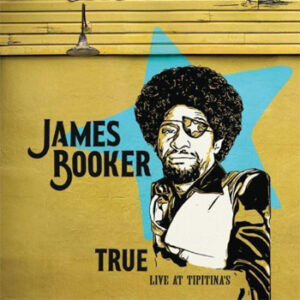 True: Live at Tipitina’s, April 25, 1978
True: Live at Tipitina’s, April 25, 1978
Tipitina’s Record Club – TRC-014
Though he passed away at age 43, New Orleans pianist James Booker earned quite a reputation during his lifetime. The self-anointed Piano Prince of New Orleans had his own brand of R&B-meets-jazz, and counted Dr. John and Harry Connick Jr. among his admirers.
Booker’s early career as a musician focused primarily on live performance, with a few singles released in the 1950s and ’60s; his debut album wouldn’t appear until 1974. Throughout the mid-’70s, he toured extensively in Europe, and by his return to the US in 1978, he was lesser known than he had been.
But his fire still burned brightly, and New Orleans audiences reacted in kind. Many of his live performances—often in bars and tiny clubs—were recorded. One of his regular gigs in that period was at New Orleans’ Maple Leaf Bar, but he also played at Tipitina’s in the city’s Uptown. One of those shows, an April 1978 date, was captured on tape.
The new album is sourced from house recordings of Booker’s three sets from that night. The nine cuts on True are a mix of originals and standards. One Helluva Nerve and Slowly but Surely had been featured on Booker’s 1977 LP The Piano Prince of New Orleans. Another classic-sounding original, Wake Up Mr. Moon Man would appear—from a live date in Germany—on the 1980 live LP Blues & Ragtime from New Orleans.
The standards include familiar tunes (Malaguena; a flowery, dramatic, and classically tinged reading of A Taste of Honey; George Harrison’s Beatles-era classic Something; and more), each recast into Booker’s energetic and inimitable style. He’s in spirited voice, pounding out a lively rhythm delivering rollicking solo breaks and generally projecting his larger-than-life persona into the ears of the gathered patrons at Tipitina’s.
In Sonny Schneidau’s liner notes—printed on a 12” x 12” insert inside the record sleeve—he self-effacingly emphasizes that his words are “not meant to be a biography” (he makes recommendations on that score). But his firsthand memories of seeing Booker onstage illuminate his writing. And Schneidau himself was the live sound technician for those shows, so listeners have him to thank for the sparking fidelity of this recording.
Tipitina’s Record Club is a new subscription service offering limited-edition, vinyl-only releases of previously unheard recordings from the legendary New Orleans music venue. Preceded by releases of music by the Radiators and Professor Longhair, and a reissue of Galactic’s debut album, True: Live at Tipitina’s, April 25, 1978 is the fourth album in the ongoing, semimonthly series. Tipitina’s Record Club releases are not available on CD, though some titles will be made available in digital format. And the vinyl records—often color, like the aqua swirl of James Booker’s True—won’t be solid in retail stores.
—Bill Kopp
RL BOYCE
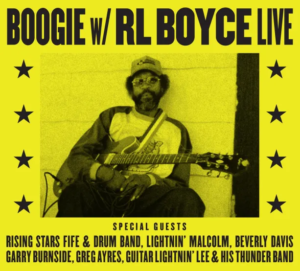 Boogie With RL Boyce Live
Boogie With RL Boyce Live
Wood B Records – No #
Como, Mississippi–based RL Boyce is joined by a bevy of fellow celebrants—many also closely associated with the northern Mississippi Hill Country—on this recording, made at the annual RL Boyce Picnic in Como on September 1, 2019. Some of the names will probably be unfamiliar to readers who aren’t intimately tied in with the Hill Country scene; others—Lightnin’ Malcolm, Shardé Thomas’ Rising Stars Fife and Drum Band, Garry Burnside—have come to garner at least some “mainstream” familiarity.
Thomas and the Rising Stars kick things off, as they traditionally do, this time with Shimmy, credited to Shardé’s venerated grandfather, Otha Tuner, and set to a rollicking funk/martial rhythm overlaid with her clear-toned, dexterous fife work (she can pull more creative ideas out of that instrument’s limited range than just about any fife player who ever lived). Offerings from Beverly Davis and the Garry Burnside Band; the Eric Deaton Trio; Guitar Lightnin’ Lee and his Thunder Band; and the Greg Ayres Band follow, setting the stage for Boyce himself, accompanied by Lightnin’ Malcolm, on three churning trance-boogie offerings (all in the same key, although in the heat of the moment this most likely didn’t matter very much).
Obviously, a good time was had by all, and there are more than enough stellar musical moments on offer here to make this an enjoyable listen, even without the various stimulants (emotional, spiritual, and otherwise) that no doubt permeated the atmosphere in Como Community Park that day. (Too bad individual credits aren’t given, though—it’s frustrating not to know for sure who’s playing and/or singing what on a lot of these offerings). The good news is that Mississippi blues is alive and well in the Hill Country; even better news is that the RL Boyce Picnic is on again for this year (the weekend of October 16–17). So—“the Good Lord willing and the creek don’t rise”—we can be optimistic that it will stay that way for the foreseeable future.
—David Whiteis
CAROLYN WONDERLAND
 Tempting Fate
Tempting Fate
Alligator Records – ALCD5007
Any new album by blues guitar wizard, singer-songwriter Carolyn Wonderland is a cause for celebration, and listeners should run, not walk, to their local record store to pick up as many copies as possible to give to their friends. We can feel Wonderland’s joyous spirit flowing through the speakers as she delivers her exuberant brand of blues. Tempting Fate also marks a celebration for Wonderland as she makes her label debut on the iconic Alligator Records. She’s joined on the album by a number of guests; in addition to her longtime road band—Bobby Perkins on bass and Kevin Lance on drums—Wonderland welcomes Marcia Ball on piano, Cindy Cashdollar on lap steel guitar, Jimmie Dale Gilmore on vocals, Shelley King on background vocals, Jan Flemming on accordion, Red Young on organ and piano, and producer Dave Alvin on guitar.
The album launches into the stratosphere with the galloping Fragile Peace and Certain War; the skittering, propulsive rocker rides along Wonderland’s screaming lap steel and her towering vocals, which spiral higher and higher as the song lifts us onto another plane. Wonderland goes honky-tonkin’ with Ball on the sliding and slithering roadhouse rocker Texas Girl and Her Boots, an ode to her collection of boots. Broken-Hearted Blues rides a swampy, can’t-live-with-you-can’t-live-without-you barroom blues; in spite of a tinge of regret for the loss of a love, though, the powerful and energetic guitar work shoves regret out the side door with an “I-can-live-without-you-now” attitude. Fortunate Few showcases Wonderland’s ability to turn tender but still pack a punch with her gritty, soulful vocals, while the country blues Crack in the Wall shimmers with Cashdollar’s lap steel, Flemming’s accordion, and Wonderland’s warm vocals. Young’s cascading piano notes provide the musical bed for the jazzy two-stepping On My Feet Again, while Gilmore joins Wonderland for vocals on their Dead-like take on Dylan’s It Takes a Lot to Laugh, It Takes a Lot to Cry. The album closes with Wonderland’s echoing, folk blues version of Jerry Garcia’s Loser.
Tempting Fate is an album made in heaven—well, Texas—and every song showcases Wonderland’s never-waste-a-note guitar work and her soaring vocals. There may not be a better album this season.
—Henry L. Carrigan Jr.
SUE FOLEY
 Pinky’s Blues
Pinky’s Blues
Stony Plain Records – SPCD1430
Foley straps on her signature pink paisley Telecaster, “Pinky,” as she delivers a collection of blistering, hip-shaking, boisterous blues and rockabilly tunes that keep us grooving from the album’s first notes to its last. The award-winning guitarist is joined on the album by Jon Penner on bass and Chris “Whipper” Layton on drums; producer Mike Flanigin sits in on B3 on two tracks, and Jimmie Vaughan strolls into the party with rhythm guitar on the song Hurricane Girl.
The album opens with the title track, a rockabilly roadhouse blues instrumental on which Foley’s shimmering lead runs illustrate what she does best: prowl up and down the frets with a piercing and crystalline phrasing that plays the notes between the notes, creating arpeggios that cascade in waterfalls of sound. Foley drives the Angela Strehli–penned Two Bit Texas Town with a burning, churning rhythm that weaves in notes and phrases from the Stones’ Hip Shake Boogie, while the juke joint jump blues Dallas Man celebrates the great Texas guitarists who hail from the Dallas area: Blind Lemon Jefferson, Frankie Lee Sims, Freddie King, Jimmie Vaughan, and Stevie Ray Vaughan, among others. Foley gets the party started with her rocking take on the Strehli-written Southern Men, which is straight-ahead, get-down-to-business rock ’n’ roll in the style of Rocket 88. Foley scats with abandon on the boogieing Boogie Real Low by Frankie Lee Sims, while she delivers a haunting, ethereal blues moan on the slow-burning blues lounge song Say It’s Not So, also by Strehli. One of the album’s highlights might be Foley’s turning in a poignant, gospel- and pop-inflected blues, riding on the strains of Flanigin’s B3, on the Lillie Mae Donley–penned classic Think It Over. Foley never lets her fingers rest on her skittering take on Clarence “Gatemouth” Brown’s Okie Dokie Stomp; Foley’s version combines jazz, blues, and rock to produce a song that demands we get up and dance across the floor. The album closes with Foley’s can’t-sit-still take on Willie Dixon’s When the Cat’s Gone the Mice Play.
Pinky’s Blues finds Foley playing at the top of her game; she sings tough and tender, as the song requires, and she lays down a groove on “Pinky” that can compare with any blues guitarist.
—Henry L. Carrigan Jr.
AL BASILE
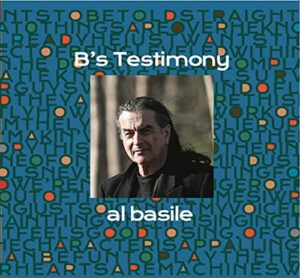 B’s Testimony
B’s Testimony
Kenoza Music – 9941
It all begins with the lyrics for Massachusetts-born singer/songwriter/horn player Al Basile, which makes perfect sense for a guy with a master’s degree from Brown University’s writing program who taught English, music, and physics at a Rhode Island high school.
Beginning in the mid-’70s when he gigged as a cornet/trumpet player in Roomful of Blues, Basile has used his gift of poetry to spin real life tales of relationships, heartache, and survival over blues-based grooves peppered with plentiful horns. Over the years, he’s also been a frequent collaborator on several projects by prolific East Coast guitarist Duke Robillard.
On B’s Testimony, his 17th solo release, Basile offers a treatise on modern relationships by using his unique knack of creating characters to deliver his take on the many ways men and women miscommunicate and just plain don’t get each other.
Basile is the producer and lone songwriter on the album that features a sturdy backing band, led by Norwegian guitar slinger Kid Andersen, that paints bluesy, jazzy musical backdrops for Basile’s stories. Unlike his previous release, 2020’s Last Hand, in which horns were largely missing, they are back in a big way here, with Basile handling the arrangements and playing cornet. With a very literal writing style—there aren’t many metaphors or hidden meanings—Basile’s songs cut right to the chase.
“He asked her if she’d like to go for a ride / she said I’d rather poke a stick in my eye,” from He Said, She Said, is about as direct as it gets. On I’m Bad That Way, Basile creates an “appalling” character who prods his significant other to “Quit your cryin’ ’cause it didn’t work out / you knew what you were gettin’ into.”
Andersen’s yearning guitar and sorrowful horns give the slow burn Don’t Kid Yourself, Baby some emotional heft, as Basile laments a relationship’s end: “Don’t do me any favors / don’t tell me one more lie.” With an Albert Collins vibe—thanks to Andersen’s short, crisp guitar fills—Up Close and Personal Best is one of the CD’s best tracks.
Sung over a smoldering groove and gospel feel, It’s Your Pain delivers some of Basile’s most poignant lyrics: “It’s your pain / you got to feel it all by yourself / don’t go blaming anyone else.”
While Basile’s vocals are workman-like, B’s Testimony proves he’s a songwriter with an uncanny ability to explore the depths of what makes relationships so mysterious, murky, and unpredictable.
—Rod Evans
T-MODEL FORD
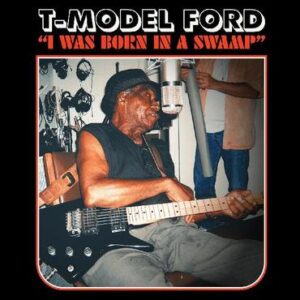 “I Was Born in a Swamp”
“I Was Born in a Swamp”
Alive Naturalsound – 0215-1
By his own admission, the late T-Model Ford didn’t begin playing the guitar until he was 58 years old, after a wife gave him one as a parting gift. Though his career may have been late-blooming, the Mississippi bluesman more than made up for it with music that was raw, vital, and filled with lived experience—music that took him across the nation and around the world.
In 2010, Ford released The Ladies Man, the first of two albums on the Alive Naturalsound imprint; Taledragger followed in 2011. The label has compiled a selection of tracks from those sessions for a new, vinyl-only edition. Pressed on clear red wax and limited to 200 copies, “I Was Born in a Swamp” is a handsome collection of some of Ford’s choicest cuts.
The tracks showcase Ford in both acoustic and electric settings with backing musicians; the players accompanying him include members of GravelRoad, Moreland & Arbuckle, Outrageous Cherry, and Soledad Brothers. The bright, crackling sound and loose energy of the recordings bring back memories of seeing Ford perform live in crowded jukes, with dancers packing the floor. While the Delta-via-Chicago strains of his idols Muddy Waters and Howlin’ Wolf can be heard in songs like Same Old Train and Someone’s Knocking on My Door, a Hill Country drone filters through, too, on tracks like Chicken Head Man. Yet Ford’s style was all his own—his whiskey-burnished vocals, assertive fretwork, and charismatic personality are front and center throughout, and he sounds equally assured with or without a full band behind him.
Capturing Ford at his elemental best, “I Was Born in a Swamp” is a fine keepsake for his fans, and would serve as a great introduction for new listeners to the charms of the Ladies Man.
—Melanie Young
SAMANTHA FISH
 Faster
Faster
Rounder Records – No #
Samantha Fish grabs the wheel and takes control on the hard-charging title track, which opens her soul-cleansing, take-no-prisoners blues rock, infused with moments of soaring pop and with incisive lyrics about moving forward. The title track funks and stomps along a powerful groove, fueled by Fish’s screaming leads and her sultry growl. The opening track draws us along with an inviting promise that this album is gonna tear out our hearts, stomp on them, and put them back in our rock ’n’ roll bodies beating with a new rhythm.
Fish is joined on Faster by producer Martin Kierszenbaum on piano, guitars, and percussion (and he co-wrote eight of the album’s 12 songs), Josh Freese on drums, Diego Navaira on bass, and Hannah Brier on backing vocals. Rapper/singer/songwriter Tech N9ne joins Fish on Loud, a pop-inflected ballad that opens spaciously with Fish’s tender vocals floating over shimmering piano notes, but which opens into brash rap rock and blues. Piercing lead runs open Better Be Lonely, a rollicking affirmation of self, while Fish turns quiet and reflective on the dreamy, sparkling jazz-infused soundscape of Crowd Control. Down-to-the-bone, straight-ahead rock rhythms drive All Ice No Whiskey, while Twisted Ambition funks off the grooves with a defiant spirit and screaming leads. Hypnotic delivers exactly what the song’s title promises, a mesmerizing groove that seduces with its magnetic power. The album closes with the slow-burning blues ballad All the Words that showcases Fish’s gorgeous vocals riding over Beatles-esque piano.
Faster finds Fish venturing into some new sonic landscapes while always delivering her signature crisp, clean, piercing leads, reflective lyrics, and scorching vocals. Fish spins us faster and faster and takes us higher and higher on her stunning new collection of songs.
—Henry L. Carrigan Jr.


